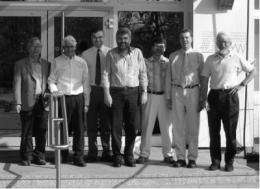Scientists refine, redefine seawater equation

This summer, one of the world's leading ocean science bodies, the United Nations Educational, Scientific and Cultural Organization's (UNESCO's) and Intergovernmental Oceanographic Commission (IOC) adopted the new international thermodynamic equation of state for seawater called TEOS-10. A complex, dynamic mixture of dissolved minerals, salts, and organic material, seawater has historically presented difficulties in terms of determining its physical chemical properties.
For 30 years, climate models have relied on a series of equations called the International Equation of State of Seawater - or EOS-80, which uses the Practical Salinity Scale of seawater. This equation was used to determine the pressure, volume, temperature proprieties of seawater. Other thermodynamic properties, including heat capacity, enthalpy and sound speed were obtained using separate equations.
The Scientific Committee on Oceanic Research (SCOR) established a working group to look at the thermodynamic properties of seawater in 2005. The team included scientists from the Leibniz-Institut für Ostseeforschung in Warnemünde (Germany), University of Miami (USA), Desert Research Institute - Nevada System of Higher Education (USA), Bedford Institute of Oceanography (Canada), the Commonwealth Scientific and Research Organization (Australia), the National Oceanographic Centre (United Kingdom) and the Institute of Marine Geology and Chemistry (China).
This committee has established a fresh approach to seawater thermodynamics. The new equation of state is in the form of a comprehensive free energy function that includes all of the thermodynamic properties of seawater. The new thermodynamic equation of state will replace the widely-use EOS-80 with a new set of highly accurate and comprehensive formulas that provide necessary adjustments and clarifications to the original equation. Dr. Rainer Feistel, from the Leibniz-Institut, is widely recognized as the pioneer in developing the new free energy function
"The previous International Equation of State of Seawater, which expresses the density of seawater as a function of Practical Salinity, temperature and pressure, served the oceanographic community well for three decades," said Dr. Frank Millero, professor of Marine and Atmospheric Chemistry at the University of Miami's Rosenstiel School of Marine and Atmospheric Science, who is the only member of the EOS-80 work group on the current team. "However, the new equation uses Absolute Salinity and is a compact 'one-stop-shop' of sorts that takes many variables that we hadn't previously included into account, and allows us to get at more precise numbers, which in turn, will make climate projections even more accurate."
Since the 1970's more than 14 graduate students, three undergrads, a high school student and four research technicians have worked on the pressure, volume, temperature and thermodynamic properties of seawater in Millero's lab at the University of Miami. These include Drs. Rana Fine and Arthur Chen, who have become important contributors to oceanographic science and education.
"Recently, our students and technicians have also been involved in examining the effect added salts in deep water have on the density of seawater in samples from all the major world oceans. The results of our investigations have been used to determine the Absolute Salinity of seawater, a variable needed as an input to the new equations," Millero added.
Source: University of Miami Rosenstiel School of Marine & Atmospheric Science
















